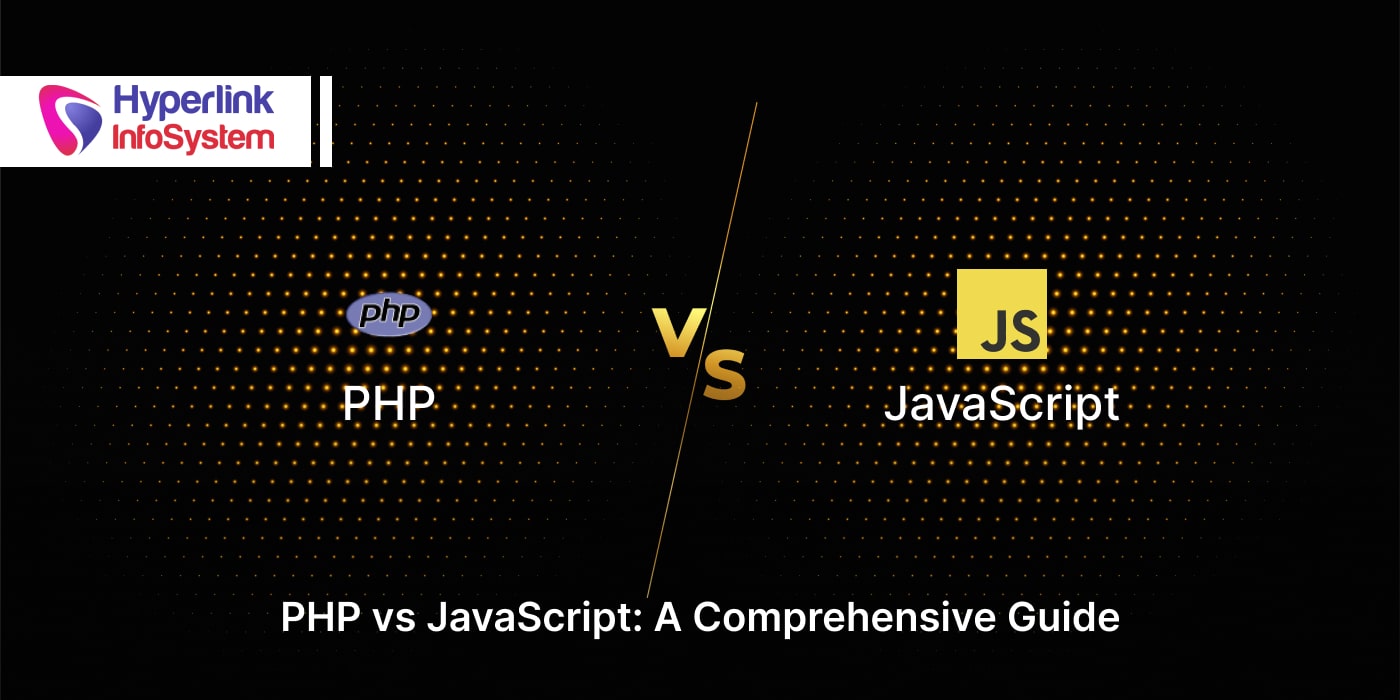PHP Vs JavaScript: A Comprehensive Guide
Sep 2024

When choosing a technology for web development, PHP and JavaScript are some common names to come across. Both of these technologies have their own unique strengths, use cases, USPs, and benefits. From the vast pool of technologies, today we will compare PHP vs JavaScript in depth to clear up the picture.
What Is PHP?
PHP, or hypertext preprocessor, is one of the most powerful tools for web app solutions. Rasmus Lerdorf created PHP 30 years ago, in the year 1994. PHP is the embedding of HTML for creating dynamic and interactive web pages. Now PHP has a really big community, extensive libraries, and frameworks, making web development very easy.
Syntax
PHP's syntax is easy to start with. Here’s a basic example:
<?php
echo "Hello, World!";
?>
Here, the `<?php ... ?>` tags show the start and end of PHP code. The `echo` statement is used to output text to the screen. PHP scripts usually have a `.php` file extension and can be embedded directly into HTML.
Pros of PHP
- Easy to Use: Any beginner can start learning PHP easily because it's really friendly to newbies; hence, it is also available for fresh developers.
- Open-Large Community and Support: Due to its extended documentation, easy accessibility, tutorials, and forums, PHP now stands among the most used, popular programming languages.
- Portability: PHP supports almost all operating systems, including Windows, Linux, and macOS, along with web servers and databases.
- Cost-Effective: PHP and most of its frameworks are free to use, such as Laravel and CodeIgniter. So it reduces development costs.
- Integration with Databases: PHP easily integrates with various databases like MySQL, PostgreSQL, and SQLite.
Cons of PHP
- Safety issues: There are chances for a website to be vulnerable to some sorts of attacks, such as SQL injection in the PHP programming language. While over the years it improved its safety measures, it still needs to be properly coded to prevent data breaches.
- Performance Limitations: PHP is never going to be suitable for enterprise-level applications because PHP is much more interpreted than complied, thus being slow compared to other languages on the server side.
- Inconsistencies: Sometimes, especially with naming conventions and error handling, PHP really is very inconsistent. This makes coding complex and hard to maintain.
Use Cases
- Content Management Systems: PHP helps to support WordPress, Drupal, Joomla, and many other platforms that are widely used for business websites, online stores, and building blogs.
- eCommerce Sites: PHP is chosen by eCommerce platforms like Magento and OpenCart because of the flexibility and integration capabilities it offers with the payment gateways.
- Server-side Scripting: PHP is used in handling tasks on the server side, such as form submission, session management, and so forth.
- Web Applications: The backbone of custom web applications for managing user interaction, data processing, and the generation of dynamic content is PHP.
- RESTful APIs: This is the major usage of PHP in developing RESTful APIs that power seamless interactions between components of a web application or as an interface to third-party services.
What Is JavaScript?
Brendan Eich created this highly dynamic programming language in the good year of 1995. It became famous for its dynamism and interactivity with web pages. Since then, with the help of Node.js, JavaScript has been in use on the server side, in addition to its use in browsers. JavaScript enables developers to create full, functional web applications that possess advanced animation, live updates, and responsiveness to user actions. Some of the top javascript frameworks are Angular.js, Vue.js, and Express.js.
Syntax
JavaScript's syntax is easy and straightforward. Here's an example:
console.log("Hello there!");
This function will print "Hello there!" and JavaScript can be embedded into HTML by using the <script> tag or including a file with a .js extension in the HTML.
Pros of JavaScript
- Faster Client-Side Performance: It directly communicates on the client-side so it provides faster responses without constantly communicating with the server.
- Versatility: Javascript can be used for both front-end and back-development.
- Large Ecosystem: JavaScript has a vivid collection of libraries, tools, and frameworks that help in faster development.
- Community Support: JavaScript possesses a large and active community that contributes a great deal of resources, assistance, tutorials, and open-source projects. This is one of the many reasons that developers prefer Javascript development.
- Interactivity and Rich Interfaces: JavaScript is the technology applied to making interactive elements on a web page, like sliders and forms, or updating content in real-time without refreshing the page.
Cons of JavaScript
- Security Risks: It is open to security risks because it runs on the client side. These vulnerabilities can lead to the leakage of sensitive information, if not managed properly.
- Browser Compatibility: Many inconsistencies across different browsers cause compatibility issues.
- Performance Issues: In CPU-intensive applications, JavaScript can cause performance blockages.
- Client-Side Dependency: Any user can turn off JavaScript on their browsers, which could render a web application useless.
Use Cases
- Web Development: JavaScript is used for the development of the front-end for making one's website interactive, animating, and often for changing real-time content on any website.
- Web Apps: Js can be used to create SPAs like Netflix, Pinterest, and more.
- Server-side and Mobile App Development: By using Node.js, it is possible to develop server-side appsapps, and with React Native and Ionic, mobile apps can be built.
- Automation and Scripting: For automation, JavaScript can be applied within some open-source environments. Web developers prefer some Javascript libraries because of the easy of use and automation.
Comparison of PHP vs JavaScript
| PHP | JavaScript | |
|---|---|---|
| First Release | 1995 | 1995 |
| Language Type | Server-side scripting language | Client-side scripting language |
| Learning Curve | Easy | Easy |
| Frameworks | Laravel, CodeIgniter, Symfony, and more | Angular.js, Node.js, Vue.js, and more |
| Security | Standard security features | Does not have in-built security features |
| Speed Performance | Excellent speed performance | Fast performance at CPU-bound tasks |
| Database Support | Supports 20 different databases | Supports almost all types of databases |
| Projects | Websites, Web apps, CMS, eCommerce, and more | Websites, Web apps, CMS, eCommerce, and more |
| Top Brands | Facebook, WordPress, Wikipedia, Mailchimp, and more. | Google, YouTube, Instagram, and more. |
| Community | Large, web-focused community | Larger and diverse community |
| Front-end vs Back-end | Mainly back-end, limited front-end | Back-end and front-end both capable |
| Extensibility | Extensible with server-side frameworks | Extensible across development areas |
PHP vs JavaScript: Which One to Choose for Web Development?
The choice of technology in web development needs to consider what the project entails. Following is a detailed guide on how to choose either PHP or JavaScript for web development:
1) Type of Project
PHP: It is well-suited for projects that require complex backend processing, database management, and content management systems. For a heavy reliance on server-side logic like eCommerce platforms and WordPress, PHP is the top choice.
JavaScript: It is best suited for interactive client-side applications. If the project needs a rich user interface, real-time updates, or single-page applications, then go for JavaScript.
2) Development Speed and Ease of Use
PHP: PHP is easy to use and learn. It also exposes a large array of libraries, built-in functions, and different frameworks that speed up the development process.
JavaScript: Again, this can be used for both the front end and the back end. The learning curve can get steeper because of this. Moreover, the asynchronous nature of Javascript can further add to its complexity.
3) Performance
PHP: PHP is good for tasks related to database interactions, file systems, and other server-side activities. However, it is not as fast as JavaScript in handling asynchronous operations.
JavaScript: It is an ideal choice for applications to work under heavy load for real-time applications like chat apps or live-streaming platforms.
4) Community and Ecosystem
PHP: It has a large and robust community along with resources, tutorials, and open-source projects. It also provides different frameworks and tools.
JavaScript: It has a comparatively massive and active community with extensive libraries, frameworks, and tools for both front-end and back-end development.
5) Scalability
PHP: PHP lacks scalability when it comes to managing real-time data handling, although it can manage large-scale applications with robust server architecture and optimized code.
JavaScript: Its event-driven, non-blocking nature makes it extremely scalable. When programs need to manage several users simultaneously, this is an excellent option.
6) Security
PHP: It has faced security challenges over the years, but with the latest frameworks and practices, these security risks can be reduced. But again, it also depends on the developer's ability to write secure code.
JavaScript: It is more vulnerable as it is exposed to the client side. Server-side coding also requires best practices to prevent attacks like SQL injection or CSRF.
7) Integration with Other Technologies
PHP: PHP is highly compatible with different databases, web servers, and third-party APIs. It is generally used in conjunction with MySQL, Apache, and Linux-based environments.
JavaScript: It is highly flexible and integrates well with a variety of technologies and services. It can be used with different databases, web servers, and third-party APIs.
Many platforms use the best of both worlds by combining them, such as PHP for backend processing and JavaScript for client-side interactivity.
Conclusion
A proper choice of programming language is necessary when developing custom web applications. Top programming languages will, in the future, continue to shape web development by being able to build more comprehensive and intelligent systems.
Detailed research should be carried out before you finally decide to hire PHP developers or approach a JavaScript development company for your project to avoid hassle or backwardness.
If you are finding the entire aspect of choosing between the one a bit challenging, it is best that you team up with a reputed web development company like Hyperlink InfoSystem to give a boost to your growth with its expertise and experience. As a leading software development company, Hyperlink InfoSystem will help you through all the nooks and corners while picking up a live language for your project. It will also help with expert development services in bringing your ideas into reality.
Frequently Asked Questions
It depends on the project needs; if you are looking to develop something that is heavily dependent on the server side, then select PHP, and if you are looking to develop real-time and interactive web pages, then go for JS.
PHP is simpler and easier to get started with because it has a simpler structure compared to JavaScript.
Yes, for a strong backend, use PHP, and for client-side interaction, you can use JavaScript.
Latest Blogs

Is BlockChain Technology Worth The H ...
Unfolds The Revolutionary & Versatility Of Blockchain Technology ...


IoT Technology - A Future In Making ...
Everything You Need To Know About IoT Technology ...

Feel Free to Contact Us!
We would be happy to hear from you, please fill in the form below or mail us your requirements on info@hyperlinkinfosystem.com
Hyperlink InfoSystem Bring Transformation For Global Businesses
Starting from listening to your business problems to delivering accurate solutions; we make sure to follow industry-specific standards and combine them with our technical knowledge, development expertise, and extensive research.
4500+
Apps Developed
1200+
Developers
2200+
Websites Designed
140+
Games Developed
120+
AI & IoT Solutions
2700+
Happy Clients
120+
Salesforce Solutions

40+
Data Science

















